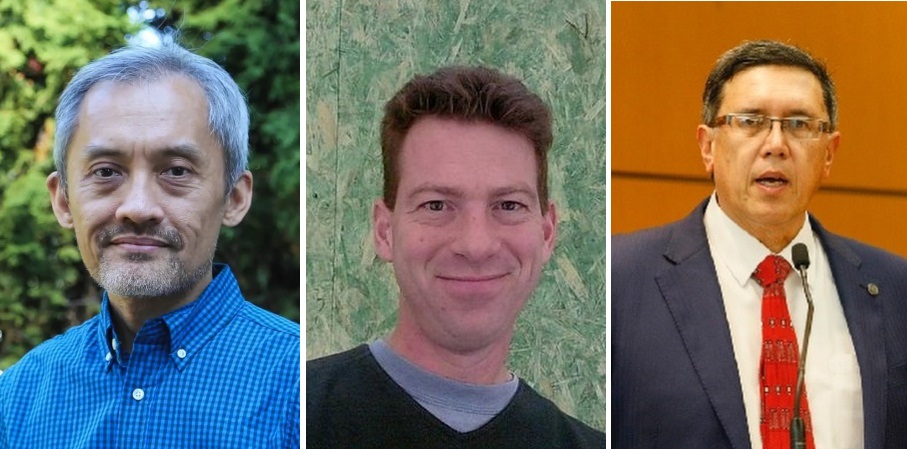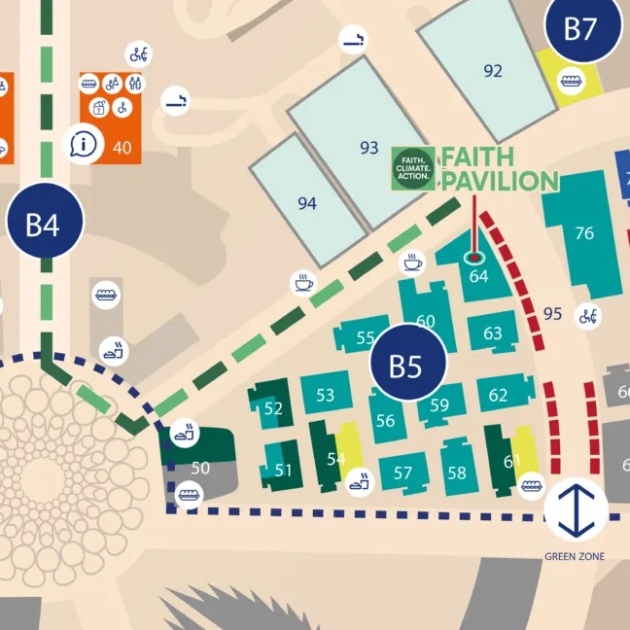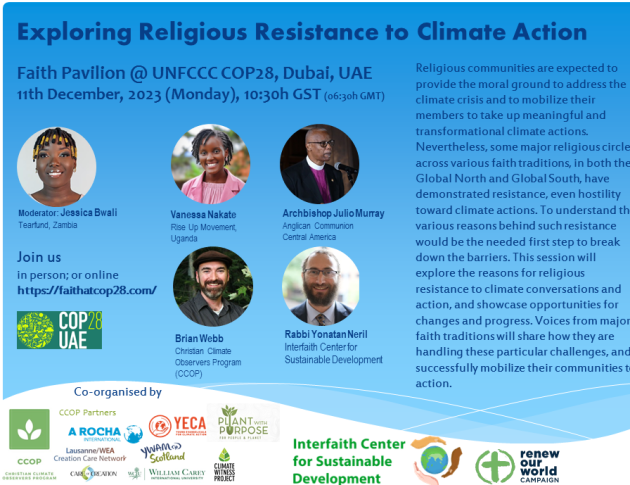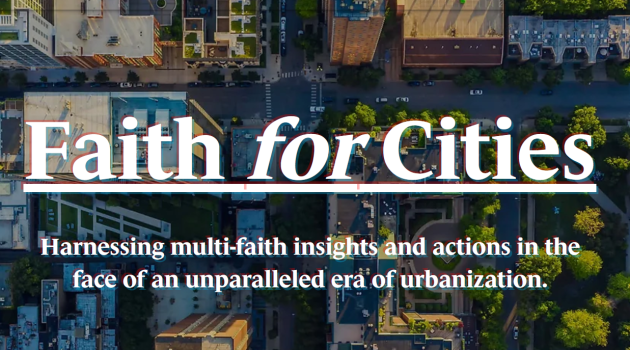Faith Pavilion: Religions have a new scenario at the COP 28 climate conference
In a central place of the ‘Blue Zone’ in Dubai, 50 faith groups organise dozens of events. Evangelical environmentalists told Evangelical Focus what they plan to do at the large UN conference.
DUBAI · 29 NOVEMBER 2023 · 10:40 CET
.jpg)
For the first time, a Conference of the Parties (COP) on climate change will have a Faith Pavilion where representatives of religions will explain what their beliefs have to say about planet care.
Cop 28 is about to begin in Dubai (United Arab Emirates) bringing thousands of world actors to the small Islamic monarchy of 10 million inhabitants, from 30 November to 12 December.
Christian environmentalists told Evangelical Focus some months ago that there were “serious concerns” about the potential “conflicts of interest” as the host country is one of the largest oil and gas producers in the world. But lobbyists of energy companies have also been very visible in previous conferences like the last COP 27 in Sharm El-Sheikh.

Samuel Chiu of A Rocha, Paul Cook of Tearfund and Chris Elisara of the WEA Sustainability Centre. The three spoke to Evangelical Focus about their involvement in COP 28 in Dubai. The Faith Pavilion in detail
Much of the hectic negotiations among accredited delegates of this year’s United Nations climate change conference will happen in the so-called ‘Blue Zone’ built at Dubai’s Expo City. It is there where the new Faith Pavilion has been set up as well.
Promoted by the Muslim Council of Elders (an entity seeking “peace in the Muslim communities”), it has the support of the COP 28 presidency and the participation of 50 other faith groups. Its aim is to “promote a global coalition of religious leaders working together for climate action”.
One of the most advertised events at the new Faith Pavillion was to be a speech by Pope Francis. But the first trip of a Roman Catholic pontiff to a COP conference was cancelled due to health issues.
The World Evangelical Alliance (WEA) told Evangelical Focus that it is one of the actors involved in the Faith Pavilion. Its secretary general, Thomas Schirrmacher, was expected to give a keynote speech at the Faith Pavilion on 2 December.

The Faith Pavilion, on the map, in the Blue Zone of the COP 28 conference in Dubai. Evangelical Christians will share the space of the somewhat small facility (with capacity for 100 people), with organisations representing Roman Catholicism, Sikhism, Judaism, Hinduism, Baha'i, Buddhism, Indigenous religions, and Zoroastrianism.
More than 65 events will be held over the two weeks, with 300 panellists, according to the Faith Pavilion’s official website.
Answering to questions of Evangelical Focus, the WEA said the programme at the Faith Pavilion would focus on the COP 28 aims and therefore no common prayers or other ecumenical activities were planned.
Inter-faith steps before COP28
Gatherings of top religious leaders to discuss the future of the planet have become more frequent in the last years. A Global Faith Leaders Summit in Abu Dhabi on 6-7 November issued a statement titled “Confluence of Conscience: Uniting for Planetary Resurgence”.
The 200 religious leaders attending, among which was the WEA’s Secretary General, said: “Our faith instils in us a sacred duty to cherish not only our human family but also the fragile ecosystem that cradles us”.
The pre-COP28 statement also called for “urgent responses by fast-tracking Energy Transitions, ensuring fairness and equity and what’s morally right” while “regarding Mother Earth as a source of life that must be protected”.
Why should Christians attend climate conferences?
But this is not the first time Christian environmentalists join the conversation at a COP conference. Hundreds have been represented at the UN high-level conference before.
Tearfund is one of the organisations with a longer history. Paul Cook, its head of advocacy, told Evangelical Focus that “Christians care about the climate emergency because we follow a God of justice”.
For Cook, being part of the conversation about climate change has much to do with loving one’s neighbour. “The world has changed over the past few decades with more frequent and severe storms, tropical cyclones, floods, droughts, earthquakes, wildfires, and pandemics. Sadly, the vulnerable, including those living in poverty, experience the brunt of the impact of these events”.
This is why his organisation is “calling on world leaders to deliver climate justice for the most vulnerable communities around the world”.
A training programme for young Christian climate observers
A Rocha, another organisation with a recognisable Christian worldview, obtained the observer status in the Glasgow conference of 2021, although has been present with side-events since the famous COP 21 in Paris.
For the last 4 years, the evangelical group focusing on biodiversity conservation has joined efforts with a dozen of other like-minded organisations to launch Christian Climate Observers, “an immersive discipleship program” training “the next generation of UN climate observers from a Christian and missional perspective”.
Samuel Chiu, a senior A Rocha member, told Evangelical Focus that through this initiative, 40 participants from countries such as the USA, Canada, Peru, Mexico, Rwanda, Nigeria and Kenya, were traveling to Dubai. Most of them were under the age of forty (students, college professors and pastors) and shared a desire to connect the Christian faith with creation care.

One of the events co-organised by Christian NGOs at the COP 28 Faith Pavilion, in Dubai, December 2023. Two of the events co-organised by A Rocha at the Faith Pavilion are “Faith and Nature: Partners in Landscape Restoration and Nature-Based Solutions” (2 December) and “Exploring Religious Resistance to Climate Action” (11 December).
During COP 28, they said they would send out daily newsletters with information from the ground.
Faith For Cities
Another evangelical representative going to Dubai these days is Chris Elisara, co-director of the WEA Sustainability Centre, who will speech at the Faith Pavilion on 5 December about the initiative “Faith for Cities”.
“Given that an estimated 70% of the global population will call cities home by 2050, the manner in which we design, develop, retrofit, and fix cities in response to the climate crisis holds immense importance for human well-being”, he told Evangelical Focus.

This “multi-faith project receives endorsement from the World Evangelical Alliance (WEA) due to its alignment with Christian values and its potential positive impact on billions of people”, Elisara continued, “as a strategic initiative that provides a significant platform for the global Christian community to organize itself to impact the development of cities to ensure they are environmentally sustainable, socially just, and conducive to human flourishing”.
Will the Faith Pavilion deliver what it promises?
The question mark as the COP 28 begins is if the new space for religious views to be heard will have an impact on the overall conference.
“We will need to observe and find out the answer during this COP”, said Samuel Chiu.
“On the one hand, the Faith Pavilion provides an unprecedented opportunity to amplify the voices and concerns from the faith communities, and also a dedicated space for more intentional opportunities and discussions for collaborations between different faith communities and other sectors, I hope this will happen”.
“On the other hand”, continued Chiu, “there is indeed a potential of ‘taming the beast’ with ‘a cage’. I do hope the former will be the reality”.
Paul Cook sees reasons to be optimistic, as the new space has the potential to “amplify stories of how different faith communities are curbing climate change and inspiring action”. For him, it is a “recognition that faith leaders and communities have a significant role to play”.
“Crucially, churches and faith communities are present before, during and after disasters. They can help strengthen social connections and resolve conflicts; bring hope in times of stress; raise awareness of risks and advocate for change; and offer help in times of crisis”, he concluded.
A kind of syncretism or just inter-religious dialogue?
In interfaith initiatives such as these organised around the UN climate change conference, the question of where the limits of interfaith cooperation lie is always raised.
“As a former pastor serving in a conservative evangelical denomination (in Canada), with a childhood/family background in the Lutheran tradition, having witnessed some of the ecumenical works and dynamics, I totally understand the concern or skepticism reflected in this question”, reflects Samuel Chiu.
“To me personally, ‘unity’ always entails ‘diversity’. Working with other traditions (within the historic wide range of Christian faith) or even other religions, on a common concern or threat, does not necessarily slide into ‘uniformity’ or ‘syncretism’. So long as we know well who we are and where we are coming from and standing (theologically, ecclesiologically, historically, culturally), and what unique contributions we are bringing to the table, I have no fear or concern”, he reflects.
The World Evangelical Alliance has also expressed that it is not afraid of the Faith Pavilion being portrayed in the media as a form of syncretism.
Published in: Evangelical Focus - world - Faith Pavilion: Religions have a new scenario at the COP 28 climate conference
Since you are here…
Evangelical Focus is a news and opinion platform that brings together Christians from across Europe and other parts of the world. We need the support of our readers to make this media project sustainable in the long term. You can support our work! Read about Evangelical Focus’s sustainability here.
Would you like to support the work of Evangelical Focus?
Use one of these methods. You can also transfer your donation to “Areópago Protestante / Evangelical Focus” IBAN: ES8521000853530200278394 (Swift / BIC: CAIXESBBXXX). Subject: “Donation Evangelical Focus”
